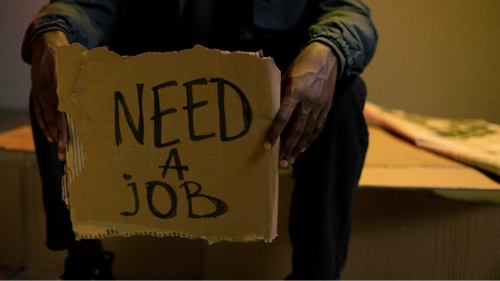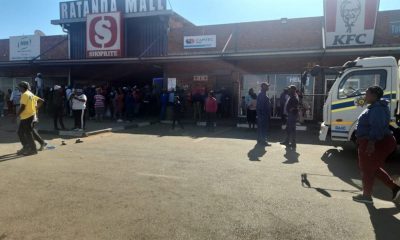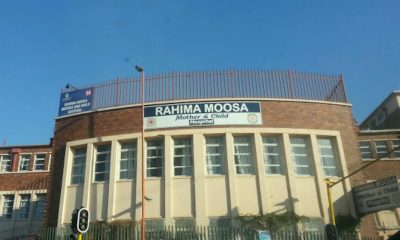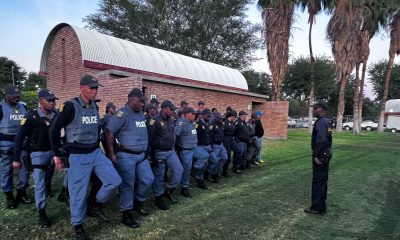News
South Africa’s Unemployment Crisis Sparks Anger

Amidst the chaos of boisterous children during a school lunch break at the Omar H.S. Ebrahim elementary school in South Africa, Lebohang Mphuthi finds herself far from her dream job. Graduating with a degree in analytical chemistry four years ago, the 26-year-old’s reality now revolves around being a student assistant at a public school in Pretoria, distributing meals and attempting to manage the disorder as reported by Federal News Network.
Also Read: Motorcyclist Suffers Severe Injuries in Harrowing Germiston Crash
Mphuthi’s experience is symbolic of the plight of numerous young South African graduates who grapple with unemployment or settle for menial roles, despite living in a country with a staggering 33% official unemployment rate. This figure starkly contradicts the nation’s global image of representing the aspirations of Africa and the developing world.
In this context, Mphuthi’s monthly earnings of $215 could be considered fortunate. However, analysts assert that the official unemployment rate fails to account for those who have relinquished their job search, yielding a more accurate estimate of nearly 42% of South Africa’s unemployed working-age population.
Distressingly, South Africa claims the ignominious distinction of having the highest unemployment rate globally, as per the World Bank, surpassing even regions like Gaza, the West Bank, Djibouti, and Kosovo. For the youth, the unemployment rate stands at 61% for 15- to 24-year-olds, escalating to a staggering 71% when accounting for those who have abandoned the employment search.
Isobel Frye, the executive director of the Social Policy Initiative, a South African organisation dedicated to researching poverty and unemployment, highlights that this situation translates to 24 million adults out of a population of 60 million who either lack employment or any economic activity, barely scraping by.
A recently delivered United Nations report on unemployment in South Africa described the situation as a “ticking time bomb.” Frye questions why this crisis was allowed to escalate unchecked.
South Africa’s GDP needs an annual growth rate of 6% to generate sufficient jobs for the 700,000 individuals entering the workforce each year. However, the nation’s growth rate has not reached this crucial benchmark for over a decade. In the past year, the economy grew by only 2%, with forecasts of less than 1% growth for the current year and a range of 1% to 2% for the following five years.
Duma Gqubule and Frye maintain that viable policies exist to alleviate unemployment. Yet, they express frustration at the issue’s lack of prominence on the agenda of government officials, private businesses, and the broader South African society. In a telling statement, Gqubule notes, “People just don’t want to talk about this crisis.”
The pandemic only exacerbated an already dire situation. Long before COVID-19, signs of mounting unemployment were evident. Themba Khumalo, a 46-year-old former machine operator, lost his job in 2017, resorting to collecting and selling recyclable materials to support his family.
Despite governmental efforts to foster entrepreneurship among the youth, the success of new businesses remains elusive, exposing a policy gap. The sentiment within the Johannesburg township of Soweto mirrors the broader landscape—unemployed individuals like Thato Sengoatsi, 25, frequent internet cafes like Mothibedi Mohoje’s, seeking opportunities.
Sengoatsi and Mphuthi represent South Africa’s “Born Free” generation, born after the dismantling of apartheid in 1994, growing up in a free nation with the promise of brighter futures. However, unemployment casts a dark shadow, undermining their hopes and aspirations.
The consequences are palpable. Desperation and anger intertwine. A recent job offering by the premier of Gauteng province drew a queue of over 40,000 in the winter cold, vying for only 6,000 positions.
A dire warning from the United Nations underscores how unemployment imperils the nation’s stability. The U.N. points to the 2021 riots and looting that claimed over 350 lives, labelling it the worst violence since apartheid’s end. Yet, this extreme manifestation of unrest amplifies weekly protests rooted in poverty and joblessness, with many of the rioters belonging to the legion of jobless young South Africans.
South Africa’s inaugural generation of Born Frees, now in their mid to late 20s, confronts a harsh reality, living in a country with the world’s highest unemployment rate. This scenario marks “the most heartbreaking betrayal of the promises and dreams of our liberation,” according to Gqubule.
Genuine concern extends to the future of younger generations. Mphuthi, herself young, worries about the prospects awaiting the children she assists at the elementary school.
The prevailing sentiment underscores the immediate crisis and foretells a potentially catastrophic future. Frye’s warning that “we’ll have a massive problem in five, 10, 15 years’ time” carries profound implications for the structure of South African society.
Also Read:
Eskom’s Improved Generation Capacity Sparks Minister’s Optimism
Follow us on Google News
Photo by Ron Lach




















